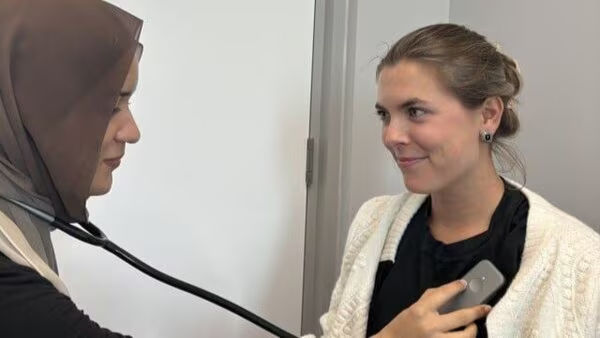AI Stethoscope Enables Early Detection of Heart Conditions in 15 Seconds
- Sep 3, 2025
- 3 min read
Updated: Sep 6, 2025

An innovative artificial intelligence (AI)-enabled stethoscope is transforming the detection of heart conditions, allowing doctors to identify three critical conditions in as little as 15 seconds. This significant advancement, presented at the European Society of Cardiology’s annual congress in Madrid, promises to revolutionize primary care and the early detection of cardiac ailments.
The traditional stethoscope, invented in 1816, has been a fundamental medical tool. However, its AI-powered version goes far beyond human listening: it is capable of analyzing minute differences in heart rhythm and blood flow that are undetectable to the human ear, and simultaneously performs a rapid electrocardiogram (ECG). This compact device, about the size of a playing card, is placed on the patient’s chest to record both the electrical signals from their heart and the sound of blood flowing through it. The captured information is securely sent to the cloud, an online data storage area, where it is analyzed by AI algorithms trained on data from tens of thousands of people. These algorithms can detect subtle heart problems that a human might miss. The analysis results, which indicate whether the patient is at risk for any of the conditions, are sent directly to a smartphone.
The study in question, called TRICORDER, was co-funded by the British Heart Foundation (BHF), the National Institute for Health and Care Research (NIHR), and Imperial Health Charity. Conducted by researchers at Imperial College London and Imperial College Healthcare NHS Trust, the research involved examining 12,725 patients across 96 primary care practices in North West London.
This AI stethoscope has proven effective in detecting:
Heart failure: A condition where the heart does not pump blood efficiently around the body. Patients examined with the device were 2.33 times more likely to be diagnosed with this condition in the next 12 months.
Atrial fibrillation: An abnormal heart rhythm that can significantly increase the risk of a stroke. The likelihood of diagnosis for this condition increased 3.45 times with the use of the AI stethoscope.
Heart valve disease: Occurs when one or more heart valves do not work properly. Diagnoses were almost twice as likely (1.92 times more probable) compared to traditional methods.
Early diagnosis is vital for all three conditions, as it allows patients who may need potentially life-saving medications to be identified sooner, before their health deteriorates dangerously. Dr. Sonya Babu-Narayan, Clinical Director at the BHF, emphasized the importance of these innovations for early diagnosis, especially in cases of heart failure, which is too often diagnosed at advanced stages when patients arrive at the hospital in an emergency.
Despite the great potential of this technology, the study also revealed challenges: 70% of the GP practices that received the smart stethoscopes stopped using them or used them infrequently after 12 months. Researchers suggest that significant efforts are needed to integrate this technology into GPs' existing routines to achieve wider and more effective implementation.
Furthermore, it was observed that two-thirds of the people identified by the AI stethoscope with suspected heart failure did not actually have it after undergoing additional tests such as blood tests or heart scans. This situation could lead to anxiety and unnecessary tests for some patients. Therefore, researchers stress that the AI stethoscope should be used in patients with symptoms suspicious of heart problems and not for routine checks in healthy people.
Professor Nicholas Peters from Imperial College London stated: "Our study shows that three heart conditions can now be identified in one sitting" and highlighted that the technology is already available to some patients and is being widely used in GP surgeries. The team plans to expand the use of this technology, manufactured by the Californian company Eko Health, to other regions of the UK. Professor Mike Lewis, NIHR Scientific Director for Innovation, added that this tool could be a "game-changer" for patients, giving primary care doctors the ability to detect problems earlier and diagnose patients in the community.










Four years ago, my husband was diagnosed with IPF (Idiopathic Pulmonary Fibrosis), a moment that changed our lives significantly. For more than two years, he followed his prescribed medications and attended regular medical checkups. Despite this, his symptoms persisted, and we remained concerned about his overall health. He struggled with low energy, frequent discomfort, and the emotional stress that came with ongoing uncertainty.In search of additional support, we decided last year to explore a herbal treatment program offered by NaturePath Herbal Clinic. We approached it cautiously and without high expectations. Over time, however, we began to notice encouraging changes. His tiredness eased, his digestion became more stable, and he appeared stronger and more at ease overall. Little by little, his…